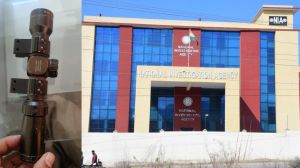Nagasaki Day 2024: All you need to know about the date, history, and significance
Nagasaki Day, observed annually on August 9th, commemorates the tragic atomic bombing of Nagasaki during World War II.
 Nagasaki Day serves as a solemn reminder of the devastating impact of nuclear weapons on civilian populations and the importance of commemorating the lives lost. (Source: Wikipedia Commons)
Nagasaki Day serves as a solemn reminder of the devastating impact of nuclear weapons on civilian populations and the importance of commemorating the lives lost. (Source: Wikipedia Commons)Nagasaki Day 2024 Date and History: Nagasaki Day, observed annually in August, is a solemn occasion that marks the devastating atomic bombing of Nagasaki, Japan, by the United States during World War II in 1945.
This tragic event followed the bombing of Hiroshima just three days earlier, making it the second and final time nuclear weapons have been used in warfare to date.
The day is marked by memorial services, peace vigils, and educational programs aimed at raising awareness about the humanitarian consequences of nuclear warfare.
As this day calls for an urgent need for global nuclear disarmament and the promotion of peaceful conflict resolution strategies, here is all you need to know about it.
Nagasaki Day 2024: Date, Origin, and Significance
Nagasaki Day marks the solemn anniversary of the atomic bombing of Nagasaki, Japan, on August 9th, 1945, during World War II; so, it is observed annually on August 9th.
In 2024, August 9th, it will fall on a Friday, under the idea of “Together with the Hibakusha, let us achieve a nuclear weapon-free, peaceful, and just world—ffor the future of humankind and our planet.”
On August 9, 1945, a U.S. B-29 bomber named Bockscar dropped an atomic bomb nicknamed “Fat Man” on Nagasaki. The bomb exploded above the city, instantly killing an estimated 40,000 people. Over the next two to four months, the effects of the bombing killed an additional 35,000 to 40,000 people.
This incident called of World War II, with about tens of thousands more dying in the following years due to injuries and radiation exposure, with the bombing causing immense destruction, with houses and buildings vaporising and leaving behind a wasteland of rubble and fire.
Survivors, known as Hibakusha, faced horrific injuries and radiation sickness, enduring immense physical and psychological suffering. In the aftermath of World War II, Nagasaki became a symbol of the horrors of nuclear warfare and the urgent need for international efforts to prevent future use of nuclear weapons.
In essence, this day serves as a significant reminder of the horrors unleashed by nuclear weapons, emphasising the importance of peace and nuclear disarmament and global efforts to prevent such devastation from ever occurring again.
Each year, Nagasaki Day is marked by memorial ceremonies, moments of silence, and educational initiatives aimed at raising awareness about the lasting impacts of nuclear weapons.
These events encourage reflection on the ethical implications of their use and highlight the urgent need for international cooperation to eliminate nuclear threats.’
Nagasaki’s journey from devastation to recovery underscores the city’s commitment to peacebuilding and its role in promoting a world free from the threat of nuclear war.
- 01
- 02
- 03
- 04
- 05































